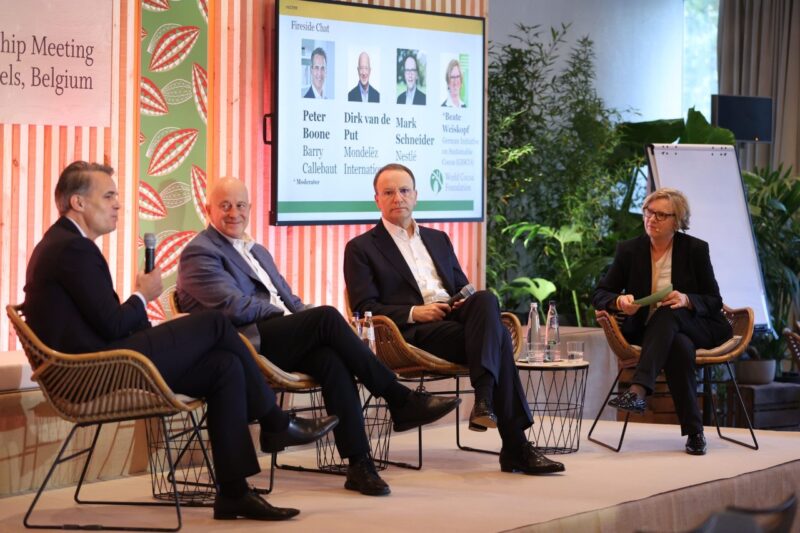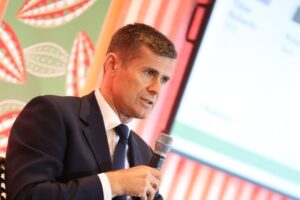World Cocoa Foundation strives to support sustainable supply chains, despite key Ghana and Ivory Coast challenges

Pic: Peter Boone, CEO of Barry Callebaut, Dirk Van de Put, CEO of Mondelez, and Mark Schneider, CEO of Nestle, gather at the WCF meeting to engage on key issues. Pic: WCF
The World Cocoa Foundation has concluded its latest annual partnership meeting, pledging commitments to improve supply chains and also drive further impact on engaging with farmers to deliver on living incomes, reports Neill Barston.
Taking place over two days in Brussels this week, the sold-out event was the first time the sustainability-focused organisation has met in person for the past three years, drawing together a broad cross-section of the sector.
As its newly appointed president Chris Vincent asserted, there had been genuine steps forward made at the international event which began on Wednesday, but acknowledged that it was ‘a missed opportunity’ that key cocoa producing nations Ghana and Ivory Coast were not represented at the meeting, which accounts for nearly two thirds of the global cocoa supply chain.
The situation was highlighted by international reports that the two West African nations had opted not to be involved with further cocoa sustainability meetings over what has been reported as a perceived lack of delivery on creating living wage standards. It comes as the region grapples with considerable fallout from fluctuating cocoa commodity markets, increased fertiliser costs and wider global geopolitical instability and logistics challenges. Fairtrade International recently described the situation in the region as a ‘supply chain crisis,’ which required urgent collaborative action.
Despite this, the event in Belgium proceeded this week with a key focus for governments, cocoa communities and businesses and organisations in the sector on the crucial topic of how to raise farmer pay – against a backdrop of many agricultural workers in West Africa still earning less than $1 a day, well below official UN poverty levels.
“We are excited to have had more than 350 stakeholders here with the shared ambition of creating a thriving and sustainable cocoa sector with the well-being of farmers and their families at the heart of everything we do,” said Chris Vincent (below), the Foundation’s new president, who has 25 years of experience working in the public, commercial and not-for-profit sectors, including strong knowledge of African regions. He has worked in development finance, and impact and Environmental and Social Governance investing, including at Merrill Lynch.

As previously reported, he was appointed alongside Peter Boone, chief executive of Barry Callebaut, who is set to serve as the organisation’s new chairman of its global operations seeking to ensure the future sustainability of the sector.
According to the organisation, the partnership meeting made progress on company commitments to make their supply chains more traceable, a key step in eliminating human rights and environmental abuses.
Notably, for the first time it heard from the chief executive officers of three WCF member companies – Boone, Mark Schneider of Nestlé, and Dirk van de Put of Mondelēz International — on their sustainability ambitions. The meeting was also addressed by the Vice President of the European Parliament, Heidi Hautala, and by two European Commissioners, Didier Reynders and Jutta Urpilainen. These European leaders told the gathering about pending European Union legislation aimed at making supply chains more sustainable.

The gathering also heard from producer countries, including Indonesia. Musdhalifa Machmud, Indonesia’s Deputy Minister of Food and Agriculture, told the meeting that producer countries needed consumer countries to share in the cost of making cocoa more sustainable. Vincent acknowledged that the absence of representatives from producer countries Côte d’Ivoire and Ghana was a missed opportunity for further progress but said the Foundation would persist in its efforts to work with the two producer countries.
“Our members will continue to focus investment through their company sustainability programs, which seek to increase farmer income directly by rewarding sustainable farming practices,” said Vincent. “They will engage with the working groups established by the Cote d’Ivoire Ghana Cocoa Initiative to develop an economic pact for sustainable cocoa.”
